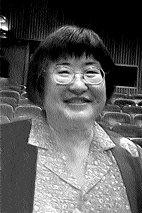
This week, the Festival of Women’s Music brought to campus five distinguished musicians who spoke candidly and humbly about music. In venues such as concerts, lectures, masterclasses, meals, and informal discussions, the four composers and a musicologist at the top of their fields were been generously accessible to the public. One of these composers, Chen Yi, was here for much of the week and spoke with me about her music and her background.Chen Yi, currently a professor at the University of Missouri-Kansas City, was born in Guangzhou, China, around the time of the cultural revolution. She described her early musical experiences with her father’s record collection, often being forced to play recordings of Western music very quietly because the music was forbidden. After she began playing violin and piano at age 3, she remembered practicing Western music on her violin with a mute to avoid being heard by others who could cause trouble. While she “was hungry” for music of many kinds, she often performed the revolutionary tunes according to regulation.
At the age of 15, Chen was sent to a forced labor camp in rural China. She spoke of this period of her life matter-of-factly, displaying no bitterness. In part, she believed that her experiences taught her about hard work. She has said that during her labor camp experiences, she tried hard to continue playing, and that “even when [she] worked for twelve hours a day as a laborer, carrying hundred-pound loads of rocks and mud for irrigation walls, [she] would play both simple songs to farmers along with excerpts from the standard western classical repertory.”
After two years in the camp, Chen returned to Beijing and continued her musical studies. During this time, she served as concertmaster and composer for the Beijing Opera Troupe. Chen described her compositional experiences there in terms of “wet ink,” explaining how the musicians would copy out their own parts from the score as soon as she would finish the pages, while the ink was still wet. Much of her composing was for either the opera orchestra or for small groups that would be made to play outside the closed curtain to entertain the audience between acts. She also said that her performing experiences taught her much about how an orchestra works.
By 1977, the school system in China was restored, and Western music was no longer prohibited. At one point, Chen was selected as one of six students in all of China to study with Alexander Goehhr, a guest professor from Britain who was the first Western professor to teach in China after the cultural revolution. She also began a systematic eight-year study of Chinese traditional music, including travels to rural areas where she transcribed much Chinese folk music and eventually became good enough to transcribe the tones in the speech of Chinese villagers.
In 1986, Chen completed her master’s degree in composition from the Beijing Central Conservatory, becoming the first woman in China to earn that degree. Her graduation was celebrated with a nationally televised and radio broadcast concert of her works performed by the Central Philharmonic of China. Since then, she has received an incredible number of commissions, as well as serving as composer-in-residence for the Women’s Philharmonic, the male vocal ensemble Chanticleer, and the Aptos Creative Arts Center. In 1993, Chen earned her doctorate in composition from Columbia University. Between 1996 and 1998, she taught in the Peabody Conservatory at Johns Hopkins University. In 2000, Chen received one of the highest honors available to composers, the Charles Ives Living Award, which gives her $225,000 to enable her to concentrate full-time on composing.
Many Lawrence students heard parts of “Qi,” one of her chamber works, at the Honors Convocation. Her music reveals both her Chinese heritage and classical music background. In the piece, Chen used Western instruments to imitate traditional Eastern instruments, while incorporating a theme that she had heard a Chinese farmer sing at the top of his lungs from a mountaintop across the Chinese countryside. In reflection of more Western musical techniques, “Qi” is organized at many levels by the Golden Mean, a proportional technique used by many Western composers from Bach to Bela Bartok.
Chen talked about the distinction between musical language and what is actually said by a piece of music. While much is made in academic circles of distinctions between musical languages such as tonal or atonal, Chen Yi said that when she was young she did not realize there was a difference, that it was all music to her. She studied as much and whatever kinds of music she could get her hands on, spending long hours at libraries studying scores. In her view, it was important to learn from all kinds of music, saying “when you hear something you like, you grab it, you go and write it down.” She also said advised that, “If you hear something you like in my music, if you change the instrument, you can do it.” The point she was making was that the way to learn is to learn from and study others, and that by adopting other types of musical language, you don’t give up the unique part of your voice.
The Festival of Women’s Music concludes on Friday night with a concert of Maria Schneider’s music performed by the Lawrence Jazz Ensemble. The concert begins at 8 p.m. in the Memorial Chapel.
